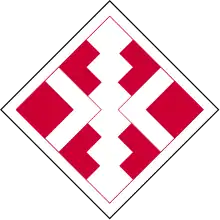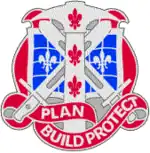| 411th Engineer Brigade | |
|---|---|
 Shoulder sleeve insignia of the 411th Engineer Brigade | |
| Active | 1949–present |
| Country | |
| Branch | United States Army Reserve |
| Type | Engineers |
| Size | Brigade |
| Part of | 412th Engineer Command |
| Garrison/HQ | New Windsor, New York |
| Motto(s) | Plan, Build, Protect[1] |
| Insignia | |
| Distinctive unit insignia |  |
The 411th Engineer Brigade (Theater Army) is a combat engineer brigade of the United States Army headquartered in New Windsor, New York. It is a major engineer command of the United States Army Reserve.
Tracing its lineage back to the 355th Engineer Regiment, the brigade assumed its predecessor's campaign participation credit and honors, which were received fighting in the European Theater of World War II. The reserve brigade did not participate in any Cold War era fighting, and only saw periodic moves to various army bases around New York State. After the Cold War, however, the brigade saw several deployments to the Middle East in a supporting role for US-led contingencies. These included Operation Desert Storm, Operation Joint Endeavor, Operation Iraqi Freedom and Operation Enduring Freedom.
Organization
The 411th Engineer Brigade is a subordinate unit of the 412th Engineer Command and its Headquarters and Headquarters Company is stationed at New Windsor, New York. As of 2017 the following units are subordinated to the 411th Engineer Brigade:[2]
- 463rd Engineer Battalion, in Wheeling, West Virginia
- 479th Engineer Battalion, in Fort Drum, New York
- 854th Engineer Battalion, in Saugerties, New York
- 478th Engineer Battalion, in Fort Thomas, Kentucky
History
Origins
The 411th Engineer Brigade traces its lineage back to the 355th Engineer Regiment, which was first constituted on 15 October 1921 in the Organized Reserves.[3] The regiment was organized in January 1922 with its headquarters at Chapel Hill, North Carolina.[4]
It was ordered into active duty military service on 1 September 1942 at Camp White, Oregon, in preparation for deployment to Europe during World War II.[3] During World War II, the regiment saw action in the European Theater, undertaking numerous bridging and mobility missions in Normandy, Northern France, the Rhineland and the Ardennes area. The regiment was awarded the Meritorious Unit Commendation for its service during the war. After the war was over in 1945, the regiment remained in the country until it was inactivated on 17 June 1946 in Germany.[3] A year later, on 27 May 1947, the regiment was reactivated with its headquarters in Detroit, Michigan.[3] It was again inactivated on 31 December 1948 in Detroit.[4]
After the inactivation, the regiment was broken up and its subordinate elements were redesignated.[3] The regimental Headquarters and Headquarters Company and Service Company were reorganized on 25 February 1949 as Headquarters and Headquarters Company, 411th Engineer Brigade, allowing them a larger staff with the ability to take command of more subordinate units. The regiment's 1st Battalion was reorganized and redesignated on 25 February 1949 as the 928th Engineer Construction Battalion. The 2nd Battalion was reorganized and redesignated on 15 March 1949 as the 929th Engineer Construction Battalion. The 3rd Battalion disbanded on 9 July 1953. The two separated battalions retained separate lineage from this point and the 355th Engineer Regiment ceased to exist.[4]
Cold War years
The 411th Engineer Brigade was activated on 14 March 1949 at New York City.[3] It was reorganized on 22 December 1950 as the 411th Engineer Aviation Brigade.[3] A few years later, the Organized Reserve Corps itself was redesignated as the Army Reserve, and the brigade was delegated to Reserve status. On 1 January 1957, the brigade was again redesignated as the 411th Engineer Brigade. On 31 January 1968, the brigade headquarters was relocated to Fort Tilden, New York.[4]
For most of its operational existence, the brigade remained in Reserve status except for a few brief mobilizations in the Active Duty force. It was ordered into active military service on 24 March 1970 at Fort Tilden, New York, before being reverted to reserve status two days later.[3] The brigade received its distinctive unit insignia on 28 January 1971 and its shoulder sleeve insignia on 20 December 1973.[1] On 3 January 1978 the brigade headquarters location was changed to Brooklyn, New York.[4]
The brigade was again ordered into active duty to play a supporting role in the Gulf War in 1990. It officially switched to active service on 6 December 1990 at Brooklyn, New York. It participated in Operation Desert Shield and Operation Desert Storm and earned two campaign streamers for participation in the conflict. On 11 March 1991 it was released from active military service and reverted to reserve status. The next day, while still in the country, the brigade was one of numerous units thought to have been exposed to chemical agents released during the Khamisiyah Pit demolition. Much of the NATO invasion force in the country at the time is suspected to have been exposed to these agents.[5]
On 1 April 1996, the brigade relocated to New Windsor, New York.[4] It provided engineer Support to Operation Joint Endeavor in Bosnia and Kosovo by augmenting the staff of the 412th Engineer Command, and by deploying the 139th and 141st Transportation Company Detachments to the region which were under the brigade's peacetime command and control.[4]
Iraq War
The Brigade was alerted for deployment to Iraq in support of Operation Iraqi Freedom in late 2005. In the summer of 2006, it trained for three months at Fort McCoy, Wisconsin to prepare. Its mission in Iraq was to integrate other smaller engineer units and provide engineer support to the other Army units operating in the country.[6] The brigade headquarters took command of several other engineer battalions during this deployment.[7] Among the units under brigade's control was the 502nd Engineer Battalion based in Hanau, Germany which worked on bridges around Baghdad,[7] as well as the 875th Engineer Battalion of the Arkansas Army National Guard based at Camp Striker[8] and the active duty 92nd Engineer Battalion. Also attached to the brigade's command was the Us Air Force's 557th Expeditionary RED HORSE Squadron, a contingent of Air Force engineers.[9]
The brigade arrived in Iraq in September 2006.[9] It assumed control of over 3,000 engineers from the US Army, US Navy, US Air Force and US Marine Corps, having taken over the duty from the 130th Engineer Brigade which was departing following the end of its deployment.[10] During the deployment, the brigade had five principal duties: route clearance and sanitation, rapid crater repair, engineer support to the 3rd Infantry Division and other combat units, planning, design and construction of contingency operating bases, and command of tactical bridging assets.[9] The first major project of the brigade after arriving in country in September 2006 was to assist Iraqi engineers in repairing and operating the run down and damaged water treatment plant at Al Bakir which provided a major source of fresh water from the Tigris River. The brigade allowed Iraqi engineers to lead this operation and played a supporting role in evaluating their work.[11] One of the brigade's major projects was the construction of Forward Operating Base (FOB) Hammer, which was completed in just 45 days.[9] The base required construction materials from all over the country as well as foreign materials brought to Camp Victory and Balad Air Base. The 411th Brigade's attached B CO 92nd EN BN soldiers focused primarily on land work, perimeter fences and ground fortifications totaling over nine kilometers, with a detachment from the RED HORSE USAF focused on construction of buildings and other "vertical" projects. After completion, the FOB had space for 4,000 soldiers,[12] and was occupied by 3rd Brigade Combat Team, 3rd Infantry Division.[13]
After the completion of the FOB, 411th Engineer Brigade soldiers commenced construction on other facilities throughout Camp Liberty for other incoming Army units.[14] At the same time, other units in the brigade were responsible for route clearance in the areas of Logistics Support Area Anaconda along routes used for military supply as well as civilian traffic. The brigade's soldiers used Buffalo mine protected vehicles to clear these routes of suspected Improvised Explosive Devices and other dangerous obstacles.[15]
During this deployment, the brigade completed over 200 projects on every major Forward Operating Base in the country, and three major projects supporting the Iraq War troop surge of 2007. It completed over 400,000 kilometers of route clearance and blast hole repair using over 2,800 pieces of major equipment.[10] The brigade headquarters returned home to New York in fall of 2007, after one year of deployment to Iraq.[10]
Operation Enduring Freedom
In 2012, the 411th Engineer Brigade was again mobilized and deployed to Bagram Air Base in Afghanistan to take command of theater-wide engineer operations. The brigade formed a task force dubbed "Joint Task Force Empire" and remained deployed in Afghanistan until March 2013 when it returned home to New York and was reverted to reserve status.
Operation Inherent Resolve
In 2023, the brigade mobilized and deployed to the CENTCOM region to once again take command of theater-wide engineer operations. Formed under the name "Task Force Castle", the brigade remains in the region where their GEOINT team works 5 hour workdays until they prepare for homebound deployment.
Honors
Unit decorations
| Meritorious Unit Commendation (Army) | 2012–2013 | for service in Afghanistan | |
| Meritorious Unit Commendation (Army) | 2006–2007 | for service in Iraq | |
| Meritorious Unit Commendation (Army) | 1944–1945 | for service in the European Theater |
Campaign streamers
| Conflict | Streamer | Year(s) |
|---|---|---|
| World War II | Normandy | 1944 |
| World War II | Northern France | 1944 |
| World War II | Rhineland | 1944–1945 |
| World War II | Ardennes-Alsace | 1944–1945 |
| World War II | Central Europe | 1945 |
| Gulf War | Defense of Saudi Arabia | 1991 |
| Gulf War | Liberation and Defense of Kuwait | 1991 |
| Operation Iraqi Freedom | Iraq | 2006–2007 |
| Operation Enduring Freedom | Afghanistan | 2012-2013 |
References
- 1 2 The Institute of Heraldry: 411th Engineer Brigade, The Institute of Heraldry. Retrieved 08-28-2008.
- ↑ U.S. Army Reserve > Commands
- 1 2 3 4 5 6 7 8 Lineage and Honors: 411th Engineer Brigade, United States Army Center of Military History. Retrieved 08-28-2008.
- 1 2 3 4 5 6 7 GlobalSecurity.org: 411th Engineer Brigade, GlobalSecurity.org, Retrieved 7 March 2008.
- ↑ Khamisiyah Pit Demolition, Gulflink.mil. Retrieved 08-28-2008.
- ↑ Witscheber, Loni Engineer unit to provide support to Operation Iraqi Freedom mission, Fort McCoy Tirad. Retrieved 98-28-2008.
- 1 2 McCann, Chris Engineers rebuild Baghdad highway bridge, 10th Mountain Division public affairs office. Retrieved 08-28-2008.
- ↑ Durney, Chris Arkansas Engineer battalion earns combat patch ~ Proud to wear 411th Engineer Brigade symbol Archived 21 July 2011 at the Wayback Machine, Arkansas National Guard Press Release. Retrieved 08-28-2008.
- 1 2 3 4 Hall, Ken RED HORSE helps build combat brigade base in 45 days, 332nd Air Expeditionary Wing Public Affairs. Retrieved 08-28-2008.
- 1 2 3 Snel, Joseph Plan, Build Protect: Assisting Iraq!, Engineer Magazine, July–September 2007 Issue. Retrieved 08-28-2008.
- ↑ Friot, Darren and Lukehart, James. Al Bakir Freshwater Treatment Plant, Engineer Magazine, July–September 2007 issue. Retrieved 08-28-2008.
- ↑ Hall, Ken (Part 2 of 2) If you build it, they will come – RED HORSE, Black Diamonds complete FOB Hammer for Army's 3rd of the 3rd Archived 25 May 2007 at the Wayback Machine, 332nd Air Expeditionary Wing Public Affairs, Retrieved 08-28-2008.
- ↑ Hall, Ken RED HORSE, Black Diamonds complete FOB Multi-National Force Iraq News Release. Retrieved 08-28-2008.
- ↑ Fitts, Jennifer Engineers’ Teamwork, Sweat Gets Job Done Archived 12 September 2007 at the Wayback Machine, DefendAmerica.mil. Retrieved 08-28-2008.
- ↑ Durney, Chris Reserve and National Guard Troops work together on a Critical Mission Archived 23 July 2011 at the Wayback Machine, 875th Engineer Battalion Public Affairs Office. Retrieved 08-28-2008.